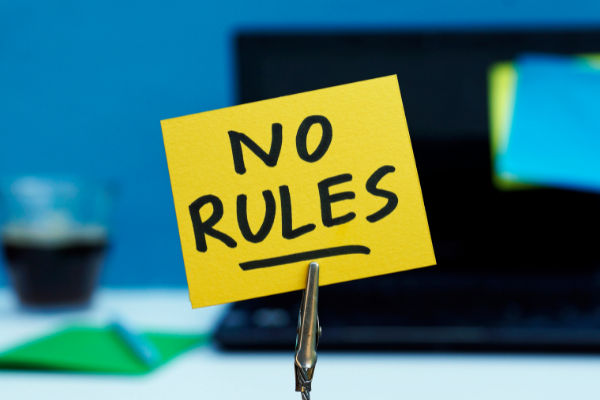Who needs to reinvent itself more right now than the legal industry? It is no secret the legal profession’s antiquated approach to solving legal problems is failing to meet the needs of the public. For this reason, other players have entered the market to fill this gap, slowing causing the market to shift in the process. Law firms desperately need to do things differently. If they don’t, they will go out of business like many other companies who watched the reinvention boat sail by.
One notable company that thought they would never be knocked from the top of the podum is Blockbuster. The story of Blockbuster’s demise is well known. Blockbuster had the opportunity to buy Netflix for $50 million in Netflix’s early days and passed. During that infamous meeting, the then Blockbuster CEO said. “The dot-come hysteria is completely overblown.” The general counsel went on to explain how the business model of Netflix and just about every other online business was not sustainable and would never make any money. I can’t tell you how many times I have similar conversations with lawyers while advocating for a shift from a billable hour to value-based pricing. And I get the same reaction from lawyers as the Netflix executives got from the Blockbuster CEO – they think it’s a joke. Read more about this infamous meeting here.
In neither situation is the proposal a joke. We all know how Blockbuster’s story ended. Blockbuster chose not to reinvent itself and later filed for bankruptcy. Netflix, on the other hand, has gone on to revolutionize the entertainment industry multiple times and has generated billions of dollars in the process. What has been the key to Netflix’s success? According to Netflix Co-Founder Reed Hastings and Erin Meyer, the best-selling author of The Culture Map, in the book No Rules Rules, it is Netflix’s culture of reinvention.
When Reed Hastings and his co-founder started Netflix, they knew from their past failed experiences that they needed to build a culture that would allow their new company to innovate quickly so that it could withstand market shifts in the ever-evolving entertainment industry. After a few years of experimentation, they developed a workable approach – give employees more freedom and responsibility instead of developing processes to prevent them from exercising their own judgment. When you do that, they will make better decisions, be happier and more motivated, and the company will be nimble.
Building a culture of freedom and responsibility
According to Hastings, you build a culture of freedom and responsibility by doing the following three things in this order: (1) build up talent density, (2) improve candor; and (3) reduce controls.
Building up talent density
The idea behind building up talent density is straightforward. If you hire talented employees who are not sloppy, unprofessional, or irresponsible, then you do not need to create processes to guard against these behaviors. And again, less processes equals more creative thinking. The second two requirements deserve more discussion.
Improving candor
Once you hire good people (i.e., build up your talent density), you can move on to improving candor, which is Netflix’s way of saying improving feedback. The idea is that talented employees have a lot to learn from each other but are robbed of the opportunity to do so because of the conventional norm that it is impolite to criticize someone else’s idea, especially in public, even if the idea could benefit from your input. I’ve watched this play out many times in meetings, especially meetings that include judicial officers and judges. The average lawyer seems extremely hesitant to say anything adverse to or in the presence of a judge, even when it has nothing to do with a case. I have been guilty of this myself, so I get it. What happens when we do that though? In my experience, when someone fails to chime in, the overall meeting suffers, and everyone is worse off for it. What’s the solution? Share what you really think, but always with positive intent. Netflix offers this framework, which they call the 4A’s:
- Aim to assist. The purpose of giving feedback should be to help the person and organization. It should not be to blow off steam, hurt the other person, or make you feel better.
- Actionable. The feedback should be delivered in a manner that allows the receiver to implement it.
- Appreciate. Receivers of feedback should welcome the feedback with an open mind and sincerely thank the person delivering the feedback.
- Accept or decline. The receiver of the feedback must consider it, but they ultimately get to decide whether to ultimately accept or decline it.
Later in the book, Hastings offers a fifth “A” – Adapt, which means that the person delivering the feedback should adapt their delivery to the culture in which they are working to get the results they need. Netflix encourages employees to give feedback anytime, anyplace.
Does your firm, organization, or community foster a culture of giving and receiving feedback? If not, what steps could you take to change that? Hastings and Meyer offer a few additional tips to help leaders get started:
- Participate in feedback training and coach employees on how to give and receive it.
- Build feedback moments into regular meetings (e.g., include it as an agenda item).
- Solicit feedback frequently and respond with belonging cues when you receive it.
- Get rid of people who act like jerks when delivering or receiving feedback.
Reducing controls
Once you have built up talent density and increased candor, you are then able to reduce controls. Netflix takes what might be considered an extreme approach here. They have eliminated travel, expense, and vacation policies, and eventually with time, approval processes. Instead of following a process, managers provide employees with the context needed to make decisions that benefit them and Netflix. I’m not sure it makes sense for every firm to roll back any or all these policies, but there are a few policies that could be eliminated, or at a minimum, improved upon and that would lead to increased employee happiness and creativity.
The first policy is the work from home policy. The pandemic has shown that we are all capable of doing our jobs from home, especially once in-person school, childcare, and other activities resume. We also know that many employees have enjoyed the benefits of working from home, such as recapturing commuting time, having access to healthy and less expensive meal options, and having greater flexibility with their day. There is no good reason not to have a flexible work-from-home policy going forward, period.
Another policy that needs to be eliminated is the billable hour requirement. The billable hour is bad for legal consumers because it fails to offer price transparency or allow them to make informed buying decisions. It’s also poisonous for attorneys and one of the contributing factors to the wellness crises we are experiencing in the profession. Having to view your life (not just work) through the lens of billable and non-billable time has serious effects on your mental health and relationships. Billable hour requirements also leave little time for a much-needed vacation.
Now you might be thinking, but my business model and attorney compensation and evaluation systems are based on the billable hour! Well, that needs to change, and there are resources and examples out there to help you get started. A good place to start is the Chicago Bar Foundation Pricing Toolkit and the On Purpose Legal pricing page. An updated and more robust version of the toolkit and companion webinar series is expected to be released this fall. If you want to be notified of its release, subscribe to our newsletter. If you are looking for examples of law firms whose business models are not tied to the billable hour, here are a few examples to get you started: Lester Law, Bartlit Beck, Valorem Law Group, and the attorneys in the CBF Justice Entrepreneurs Project network.
Start small, but start now
In sum, a higher talent density + increased candor + less controls = increased benefits to employees and firms/organizations alike. Employees will experience greater freedom, responsibility, and happiness, and the firm/organization will then be better positioned to withstand and respond to the ever-evolving needs of legal consumers.
There is no need to turn your work culture around overnight, but there is a need to get started today, even if it means only taking one small step. Remember, Netflix’s advice is to go in order. Review where your firm falls short and go from there. For example, if you already feel like you have high talent density, skip that step and start with improving candor. And again, start small. You got this!





